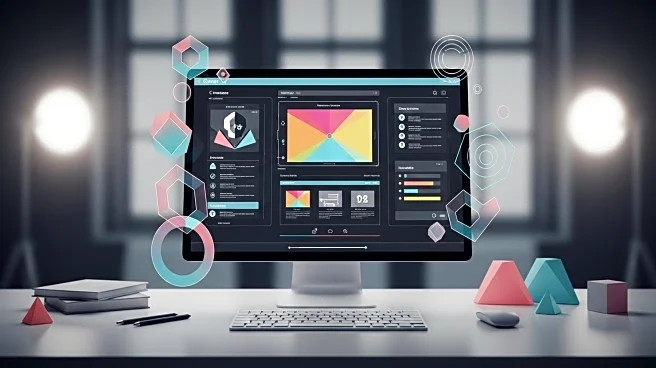What's Happening?
Framer, a Dutch company specializing in no-code web design tools, has successfully raised $100 million in a funding round, elevating its valuation to $2 billion. The investment was led by Meritech Capital Partners and Atomico, highlighting the growing interest in platforms that simplify web development through generative AI. Framer aims to challenge its major competitor, Figma, which went public in 2023 and currently holds a market cap of $37.68 billion. Framer's user base consists of 500,000 active monthly users, primarily startups, but the company is looking to expand its reach to larger enterprise clients. The funding round follows a previous $27 million raise in 2023, although the valuation at that time was not disclosed.
Why It's Important?
The significant investment in Framer underscores the increasing demand for no-code and AI-driven design tools, which are transforming the web development landscape. This trend is particularly relevant as businesses seek cost-effective solutions that do not require extensive programming knowledge. Framer's growth reflects a broader shift towards platforms that empower users to create websites and apps efficiently, potentially reducing the need for traditional developers. The funding also highlights venture capitalists' interest in AI-powered tools, as evidenced by the substantial investments in late-stage startups preparing for IPOs or acquisitions. This could lead to more innovation and competition in the tech industry, benefiting both consumers and businesses.
What's Next?
Framer plans to leverage the new funding to attract larger enterprise clients and expand its market presence. As the no-code sector continues to evolve, Framer's focus on AI-enhanced design tools positions it as a key player in the industry. The company projects to double its annual recurring revenue by 2026, driven by increasing demand for its services. The competitive landscape may see further developments as other startups, like Anysphere, also achieve high valuations. Framer's growth strategy will likely involve enhancing its platform's capabilities and expanding its user base, potentially leading to more partnerships and collaborations within the tech sector.
Beyond the Headlines
The rise of no-code platforms like Framer could have long-term implications for the tech industry, including shifts in employment patterns and skill requirements. As these tools become more prevalent, the demand for traditional coding skills may decrease, prompting educational institutions to adapt their curricula. Additionally, the democratization of web development could lead to increased innovation and diversity in digital content creation, as more individuals and small businesses gain access to powerful design tools. This trend may also influence the competitive dynamics among tech companies, as they strive to offer more user-friendly and efficient solutions.









